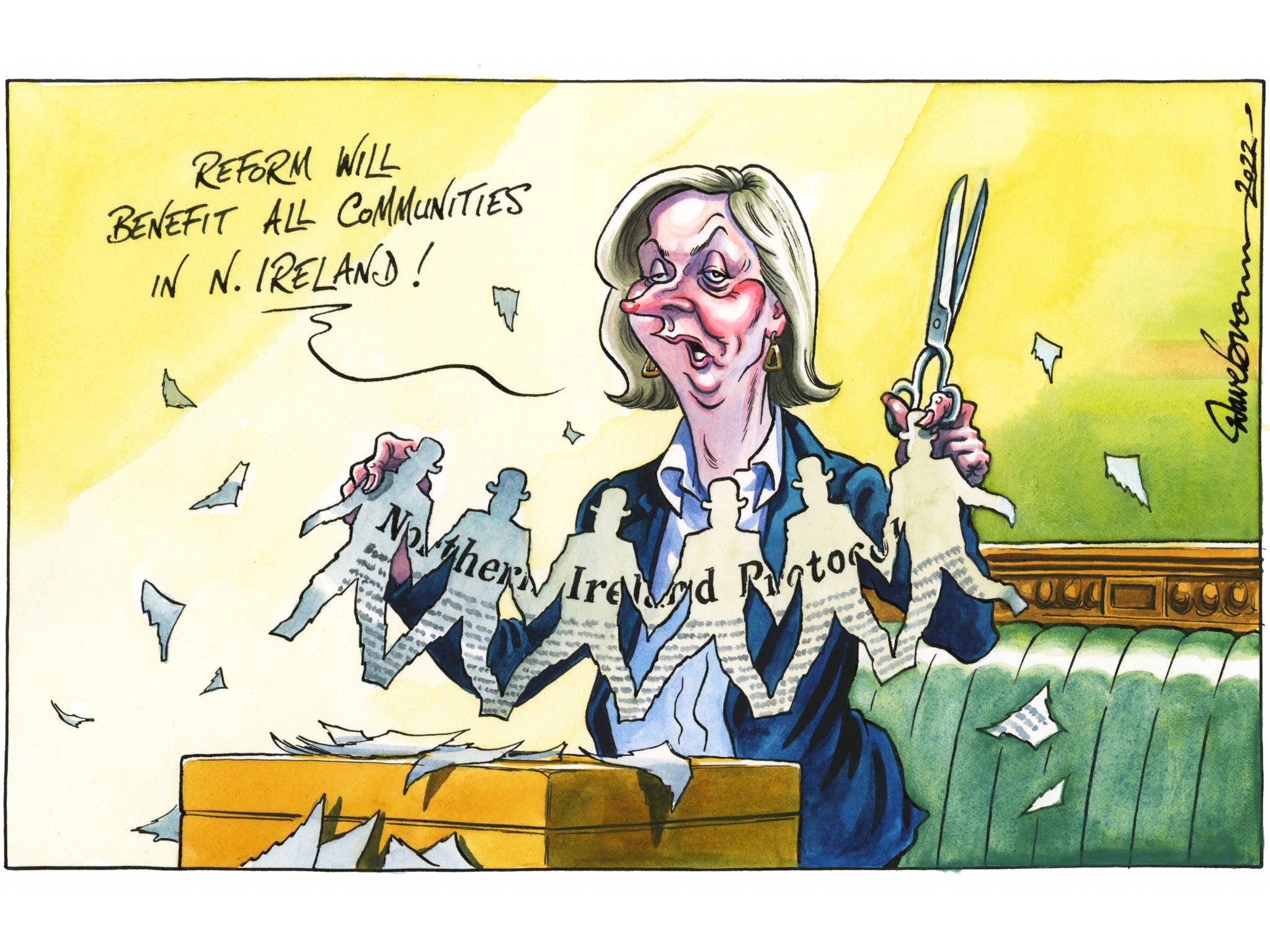Six years on from the EU referendum, Britain is still wondering how to make it work – and in particular, how it can be made compatible with the Good Friday Agreement.
The conclusion may soon dawn on those concerned that the agreement is actually incompatible with any type of Brexit likely to be acceptable to this government – logically, legally, practically or politically. The current arrangement – the Northern Ireland protocol – may be highly unsatisfactory in some respects, but, as so often in politics, it may be the best option still available – the one that comes closest to mutual compatibility.
That is, after all, how it emerged as the least bad option during the traumatic and exhaustive debates that followed the referendum. It is amenable to change in its practical application, through the existing machinery of negotiation via a joint committee, even if that is slow and requires compromise on the part of the unwilling British. The protocol is, in short, all that stands between the UK and a trade war with the European Union. It hardly needs pointing out how undesirable that would be, during a cost of living crisis and probably a recession – and nor would it make the political or economic situation in Northern Ireland any easier.
According to the prime minister, he had managed to square the circle and permit Brexit and peace in Ireland to coexist when he returned triumphant from Brussels with his “oven ready” deal to “get Brexit done” in October 2019. He made grand claims for it – claims he seems unwilling to acknowledge today.
If there was to be no trade border on the island of Ireland, and if there were to be different trading rules and economic regimes in the UK and the EU, then there was no alternative but to put the border in the Irish Sea. According to Boris Johnson, the movement of goods from Britain to Northern Ireland would be virtually uninterrupted, and any checks would be minimal. As is now apparent, he either misled those listening to him, or he didn’t read or understand the deal he signed.
In either case, it is his job to make his deal work, and not simply to ignore it – or breach it unilaterally – because his gamble failed. If he is sincere in what he says, and the deal really has led to unforeseeable consequences, then he and the foreign secretary are free to use the appropriate machinery to make mutually agreed changes. An international treaty can only be altered by mutual consent; anything else is a unilateral abrogation, unlawful, and invites retaliation.
To press her flimsy case, Liz Truss made some extraordinary claims to the Commons. She said that the EU-UK trade and cooperation agreement, an international treaty lodged with the United Nations, “was never designed to be set in stone” – which is news to the EU and everyone else who thought Brexit was “done”.
The foreign secretary also claims that the government’s own Brexit agreement requires cross-community consent in Northern Ireland. Yet there is nothing in the Good Friday Agreement about such things, and it is not a matter for the Northern Ireland assembly until the vote of consent, scheduled for 2024. It is argued that the Brexit deal is damaging the “East-West” dimension of the Good Friday Agreement, but again, there is nothing to support that in the text of the agreement.
The government of Northern Ireland could proceed while the protocol is being changed – indeed, a functioning government in Stormont would have a powerful democratic say in the talks on future rules.
All that Ms Truss has done, by using a bogus argument about the Good Friday Agreement being in jeopardy, is tie herself to the Democratic Unionist Party, and make continuing peace in Ireland contingent on a new Brexit agreement. She has made herself a willing hostage of the DUP, which has already made a hostage of the power-sharing machinery. The more threatening and disruptive the DUP is, the stronger her hand in talks with the EU – but this comes with terrifying risks.
To keep up to speed with all the latest opinions and comment, sign up to our free weekly Voices Dispatches newsletter by clicking here
Already the DUP is emboldened enough to demand that legislation be enacted, not merely tabled, before the devolved government is restored. Allowing for opposition in the Lords, judicial review and EU hostility, it is likely to take years for the new treaty-busting laws to come into effect. It is worth mentioning in this context that Northern Ireland voted to remain in the EU in 2016, and that most of the people and parties in the country want the protocol to work.
The only encouraging thing in the foreign secretary’s statement was that the text of her draft bill, itself incendiary, was missing. The talks with the vice-president of the EU Commission, Maros Sefcovic, will continue. The EU will not alter his mandate, and it holds in reserve the power to levy damaging tariffs on the UK if the treaty is unilaterally broken.
The EU will, however, try to find a way to make the protocol work as smoothly as possible. In the end, that the UK cannot make an agreement with the EU unilaterally is a matter of simple logical fact. Sooner or later, Mr Johnson and Ms Truss will need the EU’s assistance to get Brexit done.







Join our commenting forum
Join thought-provoking conversations, follow other Independent readers and see their replies
Comments